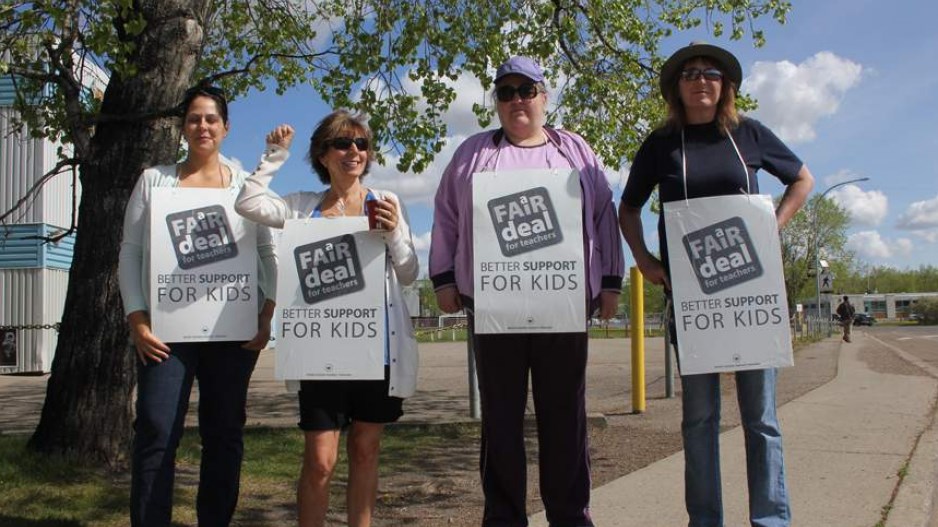Teachers across British Columbia will vote on June 9 and 10 whether the rotating strikes should develop into a full-scale walkout as part of the next phase of job action.
“This is never an easy decision because every single one of us wants the best for our students, but we believe that parents understand what we’re fighting for,” said British Columbia Teachers’ Federation (BCTF) President Jim Iker. “We hope that the vote in itself will apply pressure to both sides and hopefully spur the movement needed from the employer that will help us reach a deal.”
The BCTF reduced their wage demand by one per cent this week, bringing it to approximately 12 per cent over four years – still a ways from the government’s offer of 7.3 per cent over six years.
“Yesterday we reduced our salary proposal as part of a series of significant moves at the bargaining table, but the government responded with nothing,” said Iker. “Despite this demonstration of good will, the government remains entrenched in its position. They have not moved on the salary offer tabled back in April. And to date, they have not put a single dollar onto the bargaining table to ensure class-size limits, class-composition guarantees, and minimum levels of specialist teachers into the collective agreement.”
Education Minister Peter Fassbender responded to the BCTF’s announcement of a strike vote, saying that the government’s wage offer is in line with other agreements across the province and said that class size and composition are still on the table.
“Teachers deserve a raise, but the parties are very far apart on wages and benefits. Right now, their total compensation demands are still about four times more than the settlements reached at other tables,” said Fassbender. “[British Columbia Public School Employers’ Association] has a fair wage offer on the table, one that’s in line with recent agreements covering nearly 116,000 public sector workers. The offer also includes a special $1,200 signing bonus if we reach agreement before the end of June.”
Fassbender said BCPSEA was prepared to bargain 24/7 and through the summer if necessary, but is still intent on reaching an agreement by the end of June.
“Our goal remains a lasting, negotiated settlement that ends the disruption for parents, students and teachers and puts the system on a path to stability before the start of the next school year,” said Fassbender.
Director of Instruction for School District 59 Candy Clouthier said no decisions on how a full strike would play out in the district could be made until after the vote, and it is ultimately at the discretion of the province.
“For us, it all depends on what happens with the strike vote and based on the result of the strike vote and what action we’re being told that the BCTF may take, then we have a response,” said Clouthier. “It’s a concerted response from the provincial level.”
While there are no details on what that response might look like, Clouthier said this is a new position for the district, having the threat of a strike fall so close to the end of the school year.
“In my experience, in all of the 30 years I’ve been in this district, job action has never extended to the end of the year so this is kind of a new situation that we’ve never experienced before,” said Clouthier. “We have to think carefully about our response in regards to ensuring that students get what they need for the end of the year.”
In School District 60 as well, Superintendent David Sloan said the last full-scale strike fell in October, playing out differently in the overall effect on the school year.
“It’s an interesting time of year to have this happen,” he said, but underscored that what further job action might include is still undetermined.
“Getting a mandate to go to stage three [job action] doesn’t necessarily guarantee that teachers would go to full strike,” said Sloan. “All that does is gives their endorsement of their leadership’s proposal to go to a full walk out. If that were to happen, we would have to react appropriately.”
Prior to the BCTF’s announcement of a strike vote, The Labour Relations Board (LRB) released its findings that the government rightfully docked teachers 10 per cent of their pay during the rotating strikes – a point the BCTF brought to the LRB when the lockout provisions were announced.
“Instead of focusing on solutions in the last two weeks, the government moved ahead with its ill-conceived and chaotic lockout. Even before today’s LRB ruling, the BCTF Executive Committee met to discuss next steps,” Iker said. “We decided last night that the time has come to apply even more pressure to the negotiating table to get a fair deal and better support for students.”
With the strike vote just days away, Iker said there is still time to reach a deal if Premier Christy Clark is willing to put more money on the table, in order to avoid a strike.
Fassbender said he was disappointed with the BCTF’s plan to potentially escalate job action to a full strike but also said there is a limit to available funds.
“A full strike is only going to keep more students out of their classrooms, create more disruption for parents, while teachers and support workers caught in the middle will lose even more in wages,” said Fassbender. “There is no bottomless pit of money, and the rotating strikes are certainly not going to help teachers' and support workers' pocketbooks.”
Next week’s rotating strike schedule has been released. School District 59 teachers will be on the picket line on Thursday, June 12. School District 60 and 81 teachers will picket on Friday, June 13.




